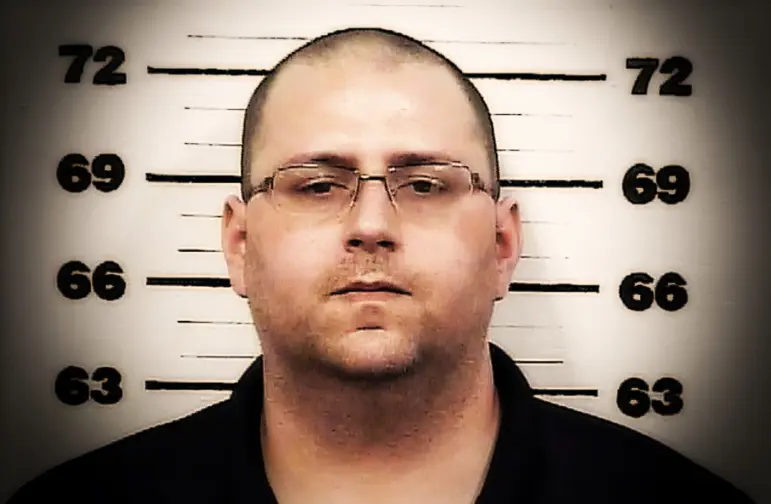A&E Switches Gears with Accused: Guilty Or Innocent
-
 Tuesday's premiere episode of Accused: Guilty Or Innocent? follows Bryan Steven Lawson, a Tennessee man who claims he shot his wife in self-defense .
Tuesday's premiere episode of Accused: Guilty Or Innocent? follows Bryan Steven Lawson, a Tennessee man who claims he shot his wife in self-defense .Primetimer editor-at-large Sarah D. Bunting knows a thing or two about true crime. She founded the true crime site The Blotter, and is the host of its weekly podcast, The Blotter Presents. Her new weekly column here on Primetimer is dedicated to all things true crime on TV.
Accused: Guilty Or Innocent, the latest true-crime offering from A&E, is surprising. For one thing, it's not what you might expect from a show with that title; experienced genre viewers might think it's a "You, The Jury" sort of set-up, with both sides of the case presented and the audience asked to "deliberate" (i.e., weigh in on Twitter) on how we'd dispose of the case. That's not what it is. Instead, it focuses on the accused parties in a range of cases, from aggravated assault to vehicular manslaughter to an attempted-murder charge tied up with implications of Munchausen's By Proxy.
It's unusual for documentary true-crime programming to portray one side of the courtroom this exclusively — ordinarily, you'd get at least nominal participation from the law-enforcement side of the case — but with the exception of court footage and/or chyrons noting that a prosecutor has offered an Accused subject a deal, viewers get the defense's perspective only.
This focus is particularly unexpected from an A&E property. A&E's true-crime programming, from 60 Days In to The First 48 to Live PD and its various spin-offs, tends to be much more interested in the state — the cops, the prosecutors, the corrections officers. Accused's attention is all on the defendant and the defense, and on the breadth of that experience: re-investigating crime scenes, deciding whether to testify on their own behalf, and defense attorneys "toughening up" their clients for what's coming in court.
While this isn't an entirely unique POV for a documentary series, Accused is, in tone and professional construction, a property you'd much sooner expect to see on a streaming service. Like Netflix's I Am A Killer, Accused: Guilty Or Innocent? lets you sit with some unsympathetic behavior on the part of its subjects (and, not for nothing, notes the role of opioid addiction in many criminal proceedings without judgment). Truth be told, Accused probably should be on a streaming service, because having devoured all four screeners the network made available, I think the series is more effective when it's marathoned, versus watched once a week.
And it's very effective — sometimes even shocking. (Tuesday premiere episode is about Bryan Steven Lawson and his claim that he shot his wife in self-defense; unusual for a basic-cable show, we see the shooting, during which the couple's toddler son was mere feet away from the victim, and the sequence is startling and heartbreaking.)
There's a metric for assessing true-crime shows that I've been trying to name for some years now — the "Google-Proof Quotient"? the "Attention/Curiosity Ratio"? — that basically boils down to how well a series can hold your attention through to its conclusion without viewers grabbing their phones to look up a verdict. Dateline and other TV newsmags tend to score poorly here, because while they're good at selecting interesting or controversial cases, they're padded with so much lugubrious B-roll and predictable talking-head commentary that they often lose our interest. Whatever name I ultimately settle on for this phenomenon (and I welcome your suggestions!), Accused gets high marks. It's smart about when in any given episode to reveal critical information about, say, what an alleged reckless driver had in his bloodstream at the time of the fatal crash, or whether the surgeries a mother allegedly pressed for were appropriate. Yes, the show does do some maneuvering to create suspense that fits its 42-minute runtime, but despite some manipulative music cues here and there, it's not slow or filler-y. There was a moment where I was tempted to hit pause and nose around Wikipedia... but just then, Accused managed to draw me back in with an awkward but riveting conversation between Lawson and his stepson. Kudos as well to the show's producers for making me wonder how many defendants like Danita Tutt get convicted not according to the statutes, but because they're kind of grating and what that says about sexism and stereotypes in the criminal-justice system.
Accused: Guilty Or Innocent isn't a perfect show. The sound design can be overbearing at times, scenes in which verdicts are announced are stretched inorganically, and a couple of the cases could have used a little more breathing room in the runtime (the neighborhood dynamics that led to a single near-fatal punch in Episode 3 are a documentary unto themselves). But the series' compelling range of cases and unique point of view more than make up for these shortcomings. While I personally hope the answer to "Will there be a second season?" is "Yes, on Hulu," wherever you watch it, Accused: Guilty Or Innocent is well worth a look.
Accused: Guilty Or Innocent? premieres on A&E Tuesday August 21st at 10:00 PM ET.
Sarah D. Bunting co-founded Television Without Pity, and her work has appeared in Glamour and New York, and on MSNBC, NPR's Monkey See blog, MLB.com, and Yahoo!. Find her at her true-crime newsletter, Best Evidence, and on TV podcasts Extra Hot Great and Again With This.
TOPICS: Accused: Guilty Or Innocent, A&E, True Crime